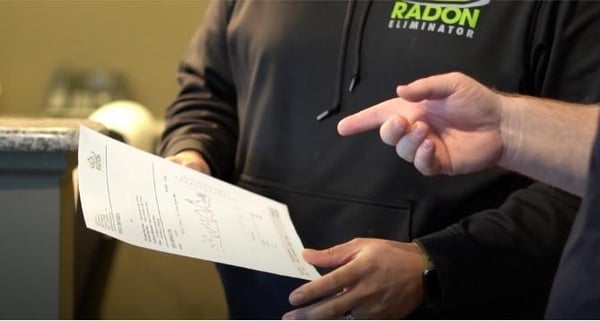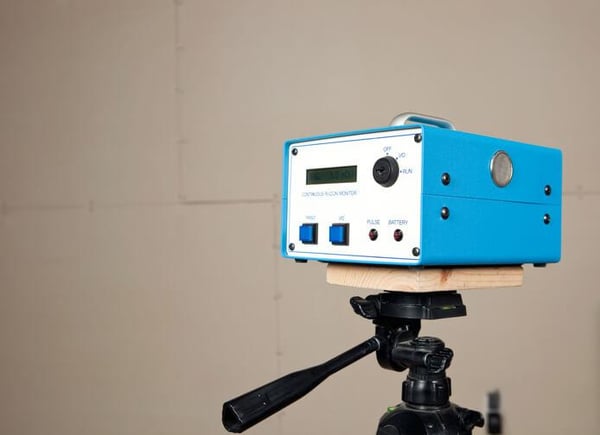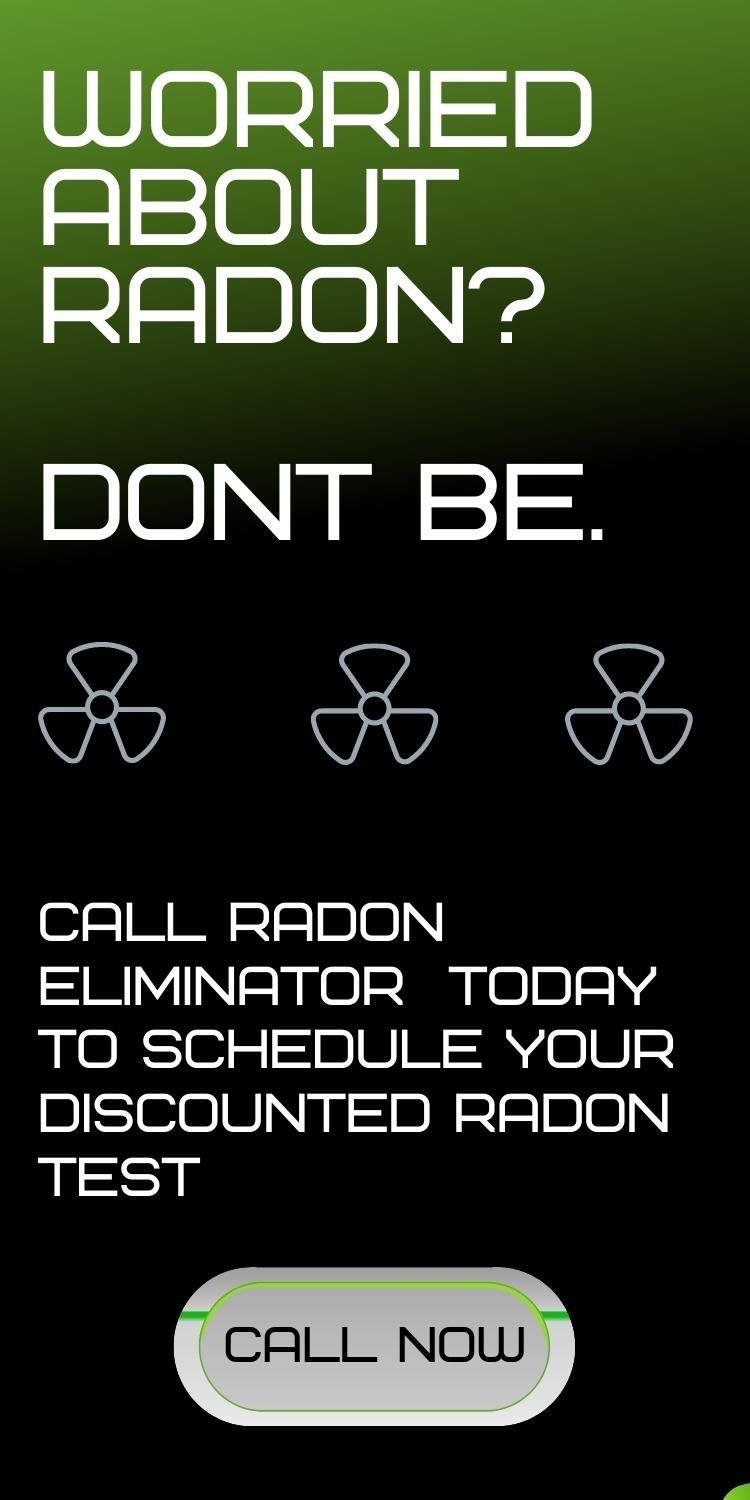Radon gas comes from the natural breakdown of uranium in rock and soil.
As uranium decays, it produces radon gas that rises from the soil.
Outdoors radon gas isn't a problem, but when it gets in your home and becomes trapped, it causes problems.
Radon gas trapped inside of your home can build up to unsafe levels. After years of exposure to it, you can develop severe health issues like lung cancer.
So what do you do to keep you and your family safe from radon exposure?
Radon is colorless, tasteless, and odorless, so the only way to know if your house has elevated radon levels is to have your home tested.
Fortunately, radon testing is easy, and if you do have elevated levels, it's relatively easy to mitigate.
And since lung cancer is such a devastating disease, testing your home for radon is a no-brainer.
Wondering if there is a way to treat your radon exposure? Read our blog post: "Is There a Cure for Radon Poisoning?"
This begs the question, can you test for radon yourself, or is it best left to a professional radon contractor?
We'll take a look at that question in the article below.
Table of Contents
- How Does Radon Get Into Your Home?
- How Much Radon Is Too Much Radon?
- Can You Test For Radon Yourself?
- The Issues With DIY Radon Testing
- Professional Radon Testing
- Contact A Professional Radon Company
How Does Radon Get Into Your Home?
After uranium has broken down into radon gas, the gas can leave the soil and enter your home through dirt crawlspaces, cracks in the foundation of a basement wall, floor drains, pipes, or sump pumps.
If you get your drinking water from a well, radon can also get into your water.

How Much Radon Is Too Much Radon?
Technically, there is no safe level of radon exposure.
Radon gas is measured in picoCuries per liter (pCi/L).
The EPA recommends that you should immediately mitigate a radon level over 4.0 pCi/L.
They even recommend taking action if you have a radon level over 2.0 pCi/L. Every home and workplace needs to be tested, no matter what the test results of the surrounding buildings are.
You can also get exposed to radon in water, but it is much more dangerous in the air.
Can You Test For Radon Yourself?
Technically, you can test for radon yourself.
You can get a radon testing kit online or at many big box stores.
Testing for radon yourself is relatively straightforward, and these tests usually consist of two vials for collecting samples and a form and mailing address.
When the test is completed, you will use the mailing address to send the sample back to the appropriate lab.
Depending on your test kit, you may keep the test in your home for at least 48 hours with a short-term test, and long-term radon tests can last for 90 days or more.
Once the test has been in your home long enough, you will send the sample to the attached lab, and they will analyze it and then provide you with the results.
It seems simple, but several factors can affect the reading your radon test kit gets.
There are several steps you need to follow to ensure your radon test kit gives you the most accurate results possible, including:
- Seal your residence. Shut all windows and doors leading to the outside as much as possible for at least 12 hours before testing. When you start your test, you need to keep everything shut as much as possible and keep all fans and air conditioners off.
- Place the test in the lowest level of your home. Whether it's a basement or a crawl space, you need to place your test in the lowest level of your home.
- Keep your radon test kit at least 20 inches off of the floor.
- Make sure your test kit isn't bothered for as long as instructed, usually between 48 and 86 hours.
- Try not to place the test near vents, windows, or exterior walls.
- Don't put the radon test in a kitchen, utility room, or bathroom. The ideal spot for your test is a living room, family room, bedroom, or open unfinished area.
The Issues With DIY Radon Testing
Since there are quite a few steps you need to follow to ensure accurate results, there are quite a few things that can go wrong with your DIY radon test.You need to ensure you place your test kit correctly, and you can skew your test results by accidentally turning on a fan, opening a window, or running the air conditioner.
There are several other issues you could come across as well.
When the test is completed, you'll need to send the results to a lab to be analyzed.
This process can take several weeks, so if you need prompt results, a DIY kit may not be in your best interest.

Professional Radon Testing
For most situations, getting your home tested by radon mitigation contractors is in your best interest.
A professional radon test will be performed by an impartial third-party trained and certified to perform tests and mitigation if necessary.
There are two tests exclusively available through certified radon professionals.
There are the passive electret test and active tests.
The electret test uses a statically charged Teflon disc.
When a radon ion strikes the disc, the electrical charge is reduced, and the total reduction is measured in their lab.
Active tests are the only ones that require electrical power.
These radon tests use a continuous monitoring device to detect and record your radon levels on a continuous radon monitor.
Suppose the professional radon mitigation company finds elevated levels of radon in your home. In that case, they can install a radon mitigation system that includes a radon fan and a vent pipe to pull the radon out of your home.
Contact A Professional Radon Company
While you can test your home for radon yourself, it's usually better to leave this work to the professionals.
The health risks of radon are too severe to chance skewing results by performing a test on your own.
And if they find elevated levels of radon, they will work quickly to install a mitigation system to reduce your risk of lung cancer.
Radon Eliminator can test your home for radon and is rapidly becoming one of the largest and most respected Radon Mitigation Service Providers in the State of Ohio.
Radon Eliminator has an experienced team of professionally certified Radon Mitigation Specialists that uses state-of-the-art radon testing and removal equipment to serve their customer's unique challenges.
To make sure your home doesn't have a radon problem, contact Radon Eliminator to test it.
If a problem is found, they will fix it.
Click the button below for your discounted test.





